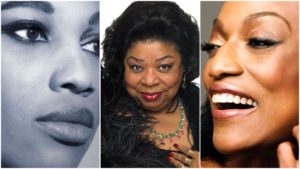
Black History Month 2019: OperaWire’s Staff On Their Favorite Black Opera Artists
By OperaWireIt’s Black History Month and a time to celebrate the achievements of the black community and how they have affected change around the world in all areas.
The opera world is no exception with many great black artists dominating around the globe in the biggest theaters there are. In celebration, some of OperaWire’s staff members have picked their favorite black singers in the history of opera and shared why they love each individual’s artistry.
Sophia Lambton – Jessye Norman
Polina Lyapustina – George Shirley
Chris Ruel – Mark S. Doss
David Salazar – Leontyne Price
Is there a more incredible vocal artist than Leontyne Price in the United States’ opera history?
She broke barriers because she was such an amazing artist with an incredible voice that is as iconic as any other. Listen to any recording from her and you are immediately struck by the intensity of her singing. Unlike other singers that have an ever-present vibrato, hers is a just another color in a varied vocal palette.
Personally, there are few singers that match her in the operas of Verdi. She has impeccable breadth of line in these operas, with a precise dramatic weight to everything she does. Her “Aida” is undeniably incredible, but for my money, her Leonora in “Il Trovatore” is easily one of the finest interpretations, particularly the performance released by the Met Opera. The way she approached the “Ascolta” that preceded “Tacea la Notte” was simply sublime, a mezza di voce that expresses wonder and caution all in one. Listening to Price take on the aria is to feel the innate structure of the piece – with its incredible dolce opening phrases crescendoing steadily until she unleashes her voice in the aria’s B melody. There is a sense of expansiveness and yet propulsive qualities in the aria that show us Leonora’s rapture. Throughout there is a sense of brightness in the singing, colored by glorious and exquisite portamenti. This is but one aria but take a listen to any recorded selection by Price and you will find this incredible array of expressivity and artistry in every single note.
Lois Silverstein – Martina Arroyo
When Martina Arroyo filled in for Birgitt Nilsson after a last minute cancellation in 1965, she took a significant step toward her Met debut as Elisabetta in Verdi’s “Don Carlo.” It took some doing, however. Her teachers “threatened” they would not teach her any longer, if she continued to treat her singing as a hobby. She spoke back, however: But “opera isn’t a real possibility; the Metropolitan Opera had NEVER [my emphasis] cast a black singer.” NEVER!! It was “a real wake-up call,” Arroyo said. “I must have been treating singing as a … lark—something I “just loved”, instead of taking it seriously. Along with the break-throughs of Verrett and Bumbry and Price, Arroyo began to trod the boards with her own sumptuous voice.
Today, Black History Month helps us celebrate how racism and near-sighted vision can be overcome as well as ignorance. May we all celebrate our rich diversity every day.
Categories
Special Features

